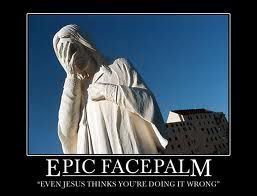- Joined
- Feb 23, 2012
- Messages
- 7,797
- Reaction score
- 3
- Points
- 0
wheatpenny said:The phrase "evening and morning" suggests literal days. I think, given Moses' use of that phrase, he definitely had literal days in mind when he wrote it
Did the author mean actual days? As a literary device, I would have no problem with that statement. Did he intend for the audience to read Genesis 1 and 2 as a textbook? I'd have all kinds of problems with that statement. Here is another example:
"...with a strong hand and an outstretched arm, for His steadfast love endures forever..."
The psalmist really means with a "hand" and with an "arm" when he wrote those words. That doesn't mean the psalmist is saying that God has hands or arms. He is using the language as a literary device in order to make his point. In like manner, the author of Genesis actually meant days when he wrote the first account, but it was in a context where the days were a "frame" upon which he built the creation account, much like stanzas are the frame upon which music is built.
---
The problem is with your use of the word "literally". Theologically speaking, to "literally" read the text is to read the text as the author originally intended. Common vernacular usage of the word "literally" generally violates the literary, historical, and cultural context in which the passage was written and is, as a result, has the opposite meaning as the theological usage of the term.
If you insist on a "plain" reading, you're going to start having problems with more than just Genesis 1 and 2. For instance "evening and morning" is used elsewhere in passages that are clearly not referring to a 24-hr period. Why don't you consistently apply that hermeneutic schema to those passages? You'll also need to start addressing why you reject a "literal" meaning for passages such as the John 6 ones (among many, many others).
---
When you look at the entire creation account(s), there are numerous problems that start to arise from reading the account(s) like a textbook. If your interpretation doesn't address these problems, it's flawed in some aspect. The greater (in number and severity) these problems, the weaker the interpretation becomes.
When you step back from reading the creation account(s) like some sort of science textbook, it is possible to reconcile the account(s) not only with themselves, but also with the culture in which they were written, the historical interpretations and general revelation (i.e. science). This degree of reconciliation makes the non-textbook interpretation the stronger interpretation and further weakens the case for the textbook answer.

